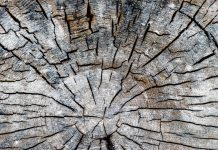Bank of the Old Mississippi. In the blinking lanterns and soft rain. They watch the dinner boats stream by. The jovial trombones and the big baritones ride the kaleidoscope currents. Night is eternal overhead, polished plush indigo, and just a crooked hook left of the moon.
Her head on his knees. The way she keeps saying to open his eyes and turn them skywards. He takes in the sweeping stars with her. Once, she showed him the impossibly blue-eyed sky over a tabasco and crawfish shack far away from the city.
He knows she’ll go home. Not even the devil could make her stay. He could only invite her here and show her the ropes. And she likes those ropes. There’s something dark and burned inside of her.
But even so, he understands, it’s not the darkness that compels her. It’s the light. She’ll follow it when it moves her. He knows he is living on borrowed time. And so is she. She has some kind of blood sickness. Her time is finite. Too few of us are immortals. Soon she’ll get her fill of too many Hurricanes and too much purple plastic. Her travels are all about seeing the world before it is consumed, while she still has the time.
One night he watched her filling a little empty baggie with cemetery dirt. Scooping the stuff straight up with her fingers. He found it elemental, her bare hands in the dirt like gardening only everything here dead. She wanted to keep it with her, everything that was gone.
There’s a field fire, wild and primitive, visible from the distance and she wants to go. The pale ones are out there. They have broken mirrors in the trees, sending fragments of the blaze and the stars across the river. He warns her not to get bitten, but she laughs and says she’s not afraid.
They slow dance in front of the fire. Broken blues on a broken radio. The palest of them all is stirring booze in a cauldron with a huge silver wand. They each pour a ladle full into their water vessels after taking a long swig. Someone’s pounding a skin drum at the edge of the clearing.
It’s way after the moon dissolves that the trolls stumble in. The energy changes. She thinks the vampires are beautiful, winged things, birds lost in time. Their evil doesn’t frighten her. But these muddy creatures are rough trade from the mines to the east or far south, and she doesn’t want the hassle. Their quarrels and brawls are not poetry, she says, because picking up lost teeth and slipping on viscera is not the same as fangs penetrating a throat or gifting eternity.
Come, she says, weaving her slender fingers around his, and they make their way back to the Quarter.
Her favourite perch in the corridors is an abandoned car sprouting ivy and daisies, in the shadows of the window of masks. She smokes and sips from her vessel and they watch the tourists going inside. She likes to guess which masks they might buy: ornately crafted Venetian leatherwork, or ceremonial wood carvings from Africa. The one she wanted most was a slender pistachio green Harlequin eye cover, plain and supple with slim slits for the mystery of her eyes. He fastened it for her, tenderly tucking her hair away from the knot.
“Look,” she says. “I can’t stay here forever.” He’s been waiting for this. She digs deeper. “You weren’t expecting me to, I know that.”
“What’s it like there?” he asks, because there’s nothing left to say and nothing that will change it. You can no more change the tides than you can change the fires.
“Mostly industrial now,” she says. Describes the place: steel and skyscrapers and on the outskirts, acres after acres of charred trees, each one a pitchfork in the red skies.
“That doesn’t sound like something to run to,” he says, but she shrugs. “Home is home.” If she has someone waiting for her, she doesn’t say so.
He draws her closer. They savour the low and heavy humidity, the mournful wailing of the saxophone. “I’ll miss this,” she says, and tips her head back to swallow the flock of thin birds overhead with her eyes. She says it’s very simple. She is homesick, nothing more or less.
There are a few surviving orchards there, she tells him after a long silence. And how that means hope. The cherry blossoms will be breaking into the bloom across the peninsula. And the strawberries in June: so round and sweet before summer.
About the Author
Lorette C. Luzajic reads, writes, publishes, edits, and teaches creative writing. She is the founding editor of The Ekphrastic Review and The Mackinaw: a journal of prose poetry. She is also an internationally collected visual artist, and her lifelong passion for art history fuels most of her stories and poems. Two of her stories have been selected for Best Small Fictions anthologies.












